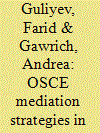| Srl | Item |
| 1 |
ID:
107891


|
|
|
|
|
| Publication |
2011.
|
| Summary/Abstract |
This article details the argument for the economic origins of the secessionist challenge posed by Indonesia's four resource-rich regions. The desire of rich regions to retain their own wealth conflicts with the national goal of sharing social welfare for equitable development across the country. The grievances of relative deprivation and aspiration to inequality were related to the distribution of resource rent by the autocratic regime of Suharto. Democratic transition opened up political space in which the resource-rich regions addressed their grievances, pushing the country to the edge of disintegration. The main policy response to the problem was decentralisation as part of the overall democratisation process. The policy has been successful so far in achieving its political objective; however, in the long run, people of the rich regions may be disillusioned because there is a risk that the supposed economic benefits of decentralisation may not materialise.
|
|
|
|
|
|
|
|
|
|
|
|
|
|
|
|
| 2 |
ID:
181639


|
|
|
|
|
| Summary/Abstract |
Even though the Organization for Security and Cooperation in Europe (OSCE) has performed mediation efforts in Eurasian secessionist conflicts, its role has been neglected by mainstream international relations (IR) and conflict mediation literature. To fill in this gap, this article examines OSCE mediation strategies in two major secessionist conflicts: the Nagorno-Karabakh (NK) conflict between Armenia and Azerbaijan and the conflict in Eastern Ukraine. Drawing on Zartman’s conceptual framework, this study posits that OSCE mediation strategies were constrained given its weak organisational capacity, lack of legal empowerment and adverse geopolitical environment. Due to these structural limitations, the OSCE can be said to have been more effective in containing conflict than contributing to conflict resolution. This article aims to contribute to conflict mediation research by highlighting the importance of context for understanding the role of international organisations (IOs) as mediators.
|
|
|
|
|
|
|
|
|
|
|
|
|
|
|
|
| 3 |
ID:
144777


|
|
|
|
|
| Summary/Abstract |
This article analyses Russia’s role in the Ukrainian crisis in the context of Moscow’s foreign policy historical development, underlining patterns of continuity and change in its policies towards the CIS. It argues that Russian foreign policy towards Ukraine results from a combination of two trends, reinforcing a Russian interventionist agenda: perceived threats to Russia’s interests in the near abroad and a radicalised and conservative national spectrum shaping foreign policy decisions. The combination of domestic and external factors driving Russia’s agenda in the near abroad raises important challenges for Russian society and its leaders as it does for its neighbours and partners.
|
|
|
|
|
|
|
|
|
|
|
|
|
|
|
|